Department News
"Education is the passport to the future, for tomorrow belongs to those who prepare for it today." Malcolm X
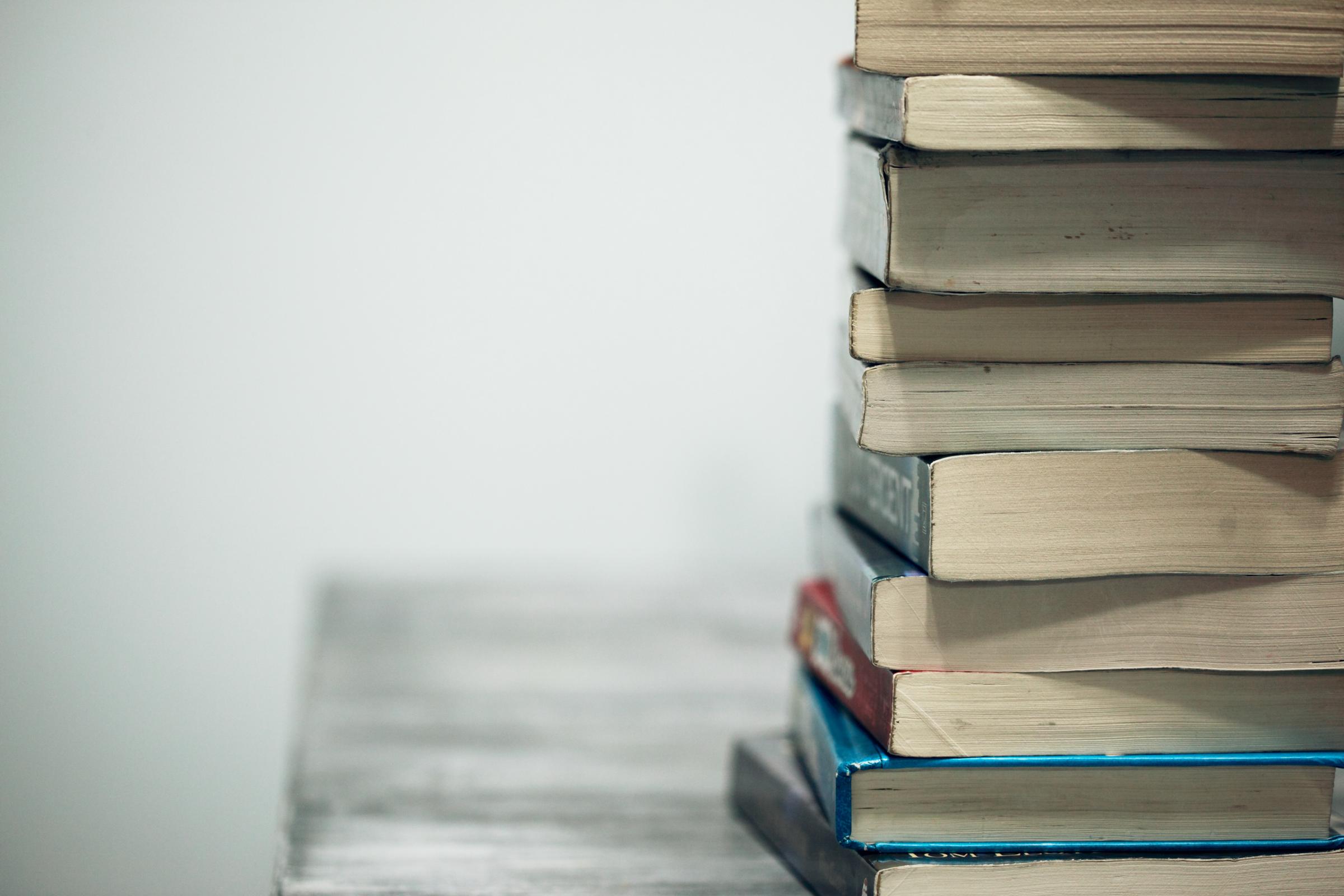
Department News
"Education is the passport to the future, for tomorrow belongs to those who prepare for it today." Malcolm X
The end of the year has dual meanings: of reminiscence on what has come to pass, as well as casting thoughts towards what could and will happen in the near and distant future. We inherit these beliefs from many cultures: Ancient Romans commemorated this passing of an annual torch by lighting candles to the two-faced god, Janus, who was portrayed in statues as looking into the future as well as into the past; at those outside a family who entered a home, as well as watching over those who dwelt within a house. This same sentiment is echoed in the dual-meaning of the Ancient Greek word, xeno, which can refer to someone who is unknown or an enemy, as well as those who have come from a long distance away and have become known as friends. These dual-meanings are similarly applicable to Christmas: early stories about the individual we now call Santa Claus depict a man who, in the depths of winter, would gift black and unlit coals to naughty children, while providing those who had been more meek with something that would warm their heart. Although he originally donned green clothing to symbolise the fertility of giving, after World War I this ancient symbolism was fused with a more commercialised and eye-catching red. Thus, when we engage with Christmas traditions, we engage with cultures that are both vibrantly alive that have been built upon a bedrock of faded memories. Some things that appear lost, persist in ways they were never meant to.
In this vein of dual-meanings, it seems appropriate when reviewing the year that was in HSIE to dwell on what has been generative as well as what has been trying; What was able to be done in the classroom when we were together, as well as opportunities that were presented in attempts to fill and compensate for that space in remote learning.
To name a few: The staff and students showed emotional resilience to hold together even at a distance for a sustained period of over four months; Students completed the end of Year 11 and 12 in remote learning; Study days were attended with a digital presence rather than a physical one. In testament to group psychology, motivation was definitely harder to maintain when in isolation. We were lucky enough that Year 10 got to see Fightin’ the Kaiser, a performance about post-traumatic stress disorder suffered by veterans of World War One.
Yet as the physicality of the community melted into a wireless space, there were opportunities that presented themselves. In Term 1, this manifested in Years 11 and 12 Ancient History getting to spend an evening hearing about latest discoveries at Pompeii with Estelle Lazer, a forensic archaeologist who is responsible for reconstructing the lives of people from disarticulated remains, and pioneering new medical technology in conjunction with Phillips and the Italian Ministry of Culture. In the closing days of Term 3, Year 10 History were treated to the unforgettable account of a survivor of the atomic bombing of Hiroshima in 1945, Sadae Kasaoka, about her experiences during and after this event. Meanwhile, Year 9 Geography, had the privilege of hearing from an educator who is deaf and an alumni of BCR: Christiane Quartararo. These vastly different perspectives can only be said to have enlarged the world views of our students and sparked such interesting, intelligent yet nuanced questions that were a great testament to the character of the young women who attend this school.
Earlier in 2021, research projects – from European, Asian, American and Australian studies – that released findings that acts of gift-giving during the first waves of COVID-19 – rather than necessarily acts of self-preservation – had unexpectedly positive impacts on mental health. Other studies also voiced concerns however, over potential “learning losses” in education, about the impact of the sudden removal of relationships that supported the wellbeing of individuals, as well as the potential consequences of widening economic inequalities. These were brought to the attention to students of Year 10 Commerce, who had the opportunity to participate in the ASX competition during Terms 3 and 4. Further, Year 9 History Elective were made aware of more entrenched forms of gender inequality and forms of social exclusion, when they were treated to Charlotte Beadon's Year 12 History Extension project about the Lindsay Chamberlain case in Australian historiography.
These experiences are credit to the HSIE staff at Brigidine, as the issues of 2021 were not shied away from and used to create learning experiences to help make sense and order in a frequently chaotic environment. To BCR students: May these experiences – ranging from mastering the mute and camera buttons to connecting with people and environments both in person and by virtual means – prove instructive for your future years.
David Nally
Head of HSIE
What are the positive benefits of learning a second language?
1. Make Connections with Others
One of the most rewarding aspects of the human experience is our ability to connect with others. Being able to communicate with someone in their language is an incredible gift. Bilinguals have the unique opportunity to communicate with a wider range of people in their personal and professional lives. Knowing the language makes you a local no matter where you are, opening up your world literally and figuratively. You will be humbled by the kindness of strangers and you will build lifelong friendships. And for these reasons alone, you will see the reward of learning languages for many years to come.
2. Advance Your Career
Language skills can be a significant competitive advantage that sets you apart from your monolingual peers. They are among the top eight skills required of all occupations—no matter your sector or skill level—and the demand for bilingual professionals is rising. Whatever your career aspiration—with language skills added to the mix, you’re ahead of the crowd!
3. Feed Your Brain
The many cognitive benefits of learning languages are undeniable. People who speak more than one language have improved memory, problem-solving and critical-thinking skills, enhanced concentration, ability to multitask, and better listening skills.
4. Deepen Your Connection to Other Cultures
Language is the most direct connection to other cultures. Being able to communicate in another language exposes us to and fosters an appreciation for the traditions, religions, arts, and history of the people associated with that language. Greater understanding, in turn, promotes greater tolerance, empathy, and acceptance of others—with studies showing that children who have studied another language are more open toward and express more positive attitudes toward the culture associated with that language.
5. See the World
Travelling as a speaker of the local language can greatly improve a trip abroad. While monolingual travellers are capable of visiting the same places, travellers who know more than one language are more easily able to navigate outside the tourist bubble and to connect and interact with the place and its people in a way that is often inaccessible to those without the language. Learning a second language also opens additional doors to opportunities for studying or working overseas.
6. Go to the Source
In a world of more than 6,000 spoken languages, we sometimes require translation, but speaking at least one additional language empowers us to access information that would otherwise be off-limits. For example, individuals proficient in other languages are able to navigate the Internet as genuine global citizens—consuming and assessing foreign media and entertainment.
7. Become a Polyglot
Not only does learning a second language improve communication skills and multiply vocabulary in your first language but research shows that it makes picking up additional languages a much easier feat, especially among children. That’s because when you learn a new language, you develop new brain networks that are primed and ready when you embark on learning a third language.
8. Increase Your Confidence
Any language learner can attest to making his or her share of mistakes while discovering a new language—often in front of an audience. It’s a necessary part of the learning process! Learning a language means putting yourself out there and moving out of your comfort zone. The positive side is the amazing sense of accomplishment you’ll feel when conversing with someone in their native language.
9. Strengthen Your Decision Making
Studies show that decisions made in your second language are more reason-driven than those made in your native language. Contrary to popular beliefs, when we deliberate in a second or third language, we actually distance ourselves from the emotional responses deeply associated with our first language.
10. Gain Perspective
As we explore a new language and culture, we naturally draw comparisons to what is most familiar. Learning about another culture sheds light on aspects of our own culture—both positive and negative—we may not have previously considered. You may find a greater appreciation for what you have, or you may decide to shake things up!
So please open up a discussion with your daughters about the many and varied benefits of learning a second language!
Janine Christofides
Head of Languages
It has been quieter than usual in the Music department of late. Due to Covid-19 restrictions, we have had to put a hold on all our Music Ensembles but we plan to be back in full swing next year.
Back in June, we were rehearsing for our upcoming concert “Brigidine Brings Back Broadway” which was due to be performed at the beginning of Term 3. The students had put in so much hard work with many hours of rehearsal and then lockdown hit. Unfortunately, we had to cancel the show which is very disappointing for everyone involved. The Music department wanted to create some kind of performance for the students so they had something to show for all the work they had done and to give them an extracurricular activity to be involved in during remote learning.
We decided it would be great fun to try an “Iso Performance”!
We invited all members of the choir and orchestra to submit a video of themselves playing or singing their part in one of the songs from the show. We are very lucky to have Ms Lau who is a whizz with technology and made all of this happen. Once all the videos were submitted Ms Lau spent hours editing the videos and audio and we are now very excited to present Brigidine’s Iso Performance of “The Greatest Show”.
Thank you to all the students who were involved. It will be something you will have to look back on in your later years and remember how we made Music during remote learning!
Our very talented performers are:
Year 11
Abigail Connolly- Voice and Flute
Holly Clatworthy- Voice
Chloe Kalogerakis- French Horn
Meira Jackson- French Horn
Giovanni Dalaguit- Voice
Olivia Alvarez- Voice
Cynthia Liong- Violin
Year 10
Yasmeen Janschek- Voice
Sarah Birrell- Violin
Marian Ibarra- Voice
Maya James- Voice
Celine Chia- Cello
Ashley Wu- Piano
Tiffany Huang- Piano
Year 8
Mia Sergio- Trumpet
A huge thank you to Ms Lau for all the work you put into this. We could never have done it without her.
Enjoy the show
Jacqueline Hanniffy
Head of Music
PDHPE is an essential key learning area, wherein a rapidly changing society the need for stronger community awareness surrounding the ideals for a healthy lifestyle is paramount. One major focus in PDHPE is to make physical education classes as enjoyable as possible. Incorporating this into assessment, as well as PE lessons can set students up for a lifetime of future physical activity and healthy living. Developing positive behaviours toward physical activity is one of our key goals for physical education.
Years 7-10 PDHPE
During remote learning in Term 4, the PDHPE Department moved full steam ahead into our practical assessments across the junior years. Each year group was given a series of sixteen exercises to work through during their timetabled PE lessons. Each of these exercises had a demonstration video link to ensure the girls executed the correct technique. With the use of technology, students needed to take a video recording or photo sequence of themselves performing 5 of these exercises, making sure to include at least two that were challenging. A range of options was available, including tricep dips, wall sits, squat jumps, push-ups, mountain climbers and burpees! The girls evaluated their performance, reflecting on their strengths and areas for improvement. Students also analysed how these movement skills could be transferred into the context of other sports. We are very proud of the girls as they adapted to their environment and worked hard performing their chosen exercises.
A report from two of our Year 7 students on the remote learning practical assessment task:
During remote learning, we were given the opportunity to complete a practical PDHPE assessment task about physical fitness. It was a very fun task to complete as it tested our fitness strengths and weaknesses which helps us to improve our overall fitness. This task also tested our analysing skills as we had to complete a table full of questions for each exercise. There was a range of different and unique exercises that we could choose to complete. This task introduced interesting new ways to exercise different parts of the body besides the common exercises frequently used.
In this task, we were able to pick five different activities to film or to create a photo sequence of. We had to choose at least two challenging exercises that really pushed and tested our fitness skills. After choosing these exercises we answered a series of questions for each of them. Some of the questions included: Why did we choose this exercise? How did it challenge us and what we could improve on. Overall it was a great task that got us up and moving during lockdown.
- Elisabeth Bernhardt and Audrey Vonwiller - Year 7
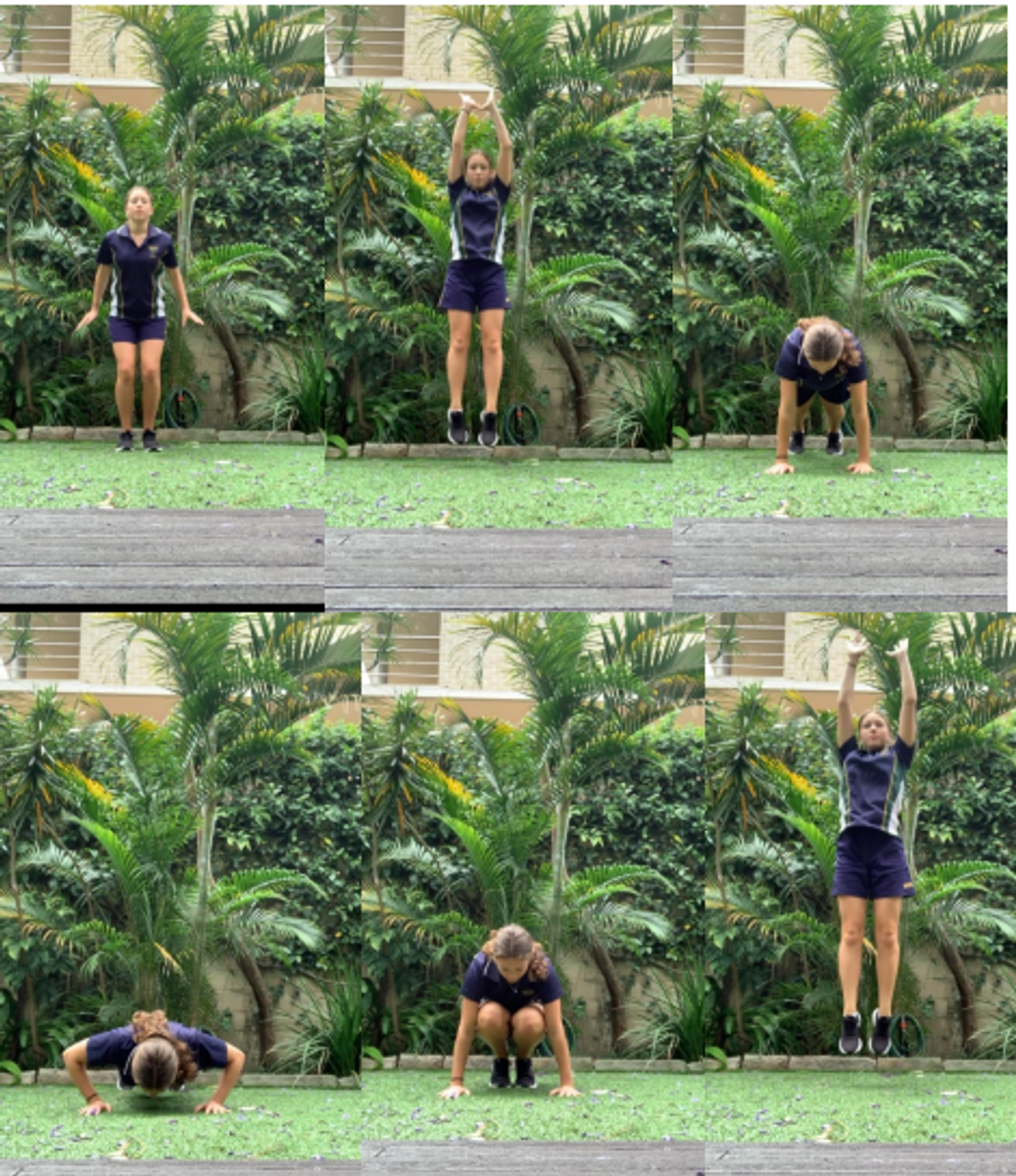
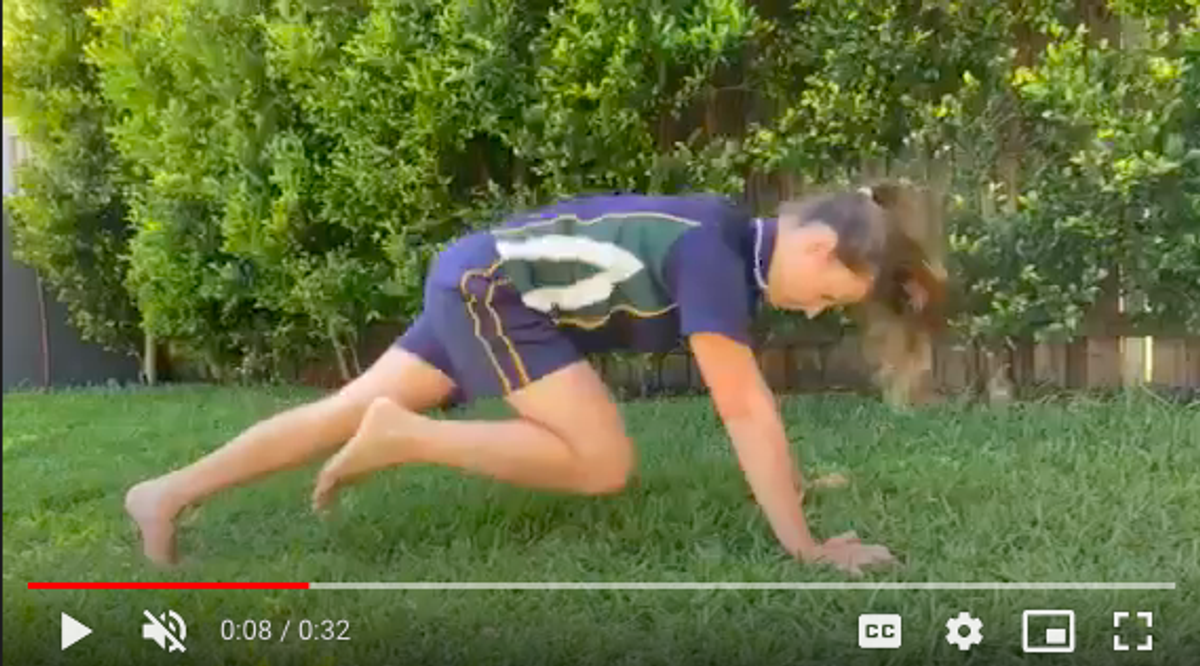
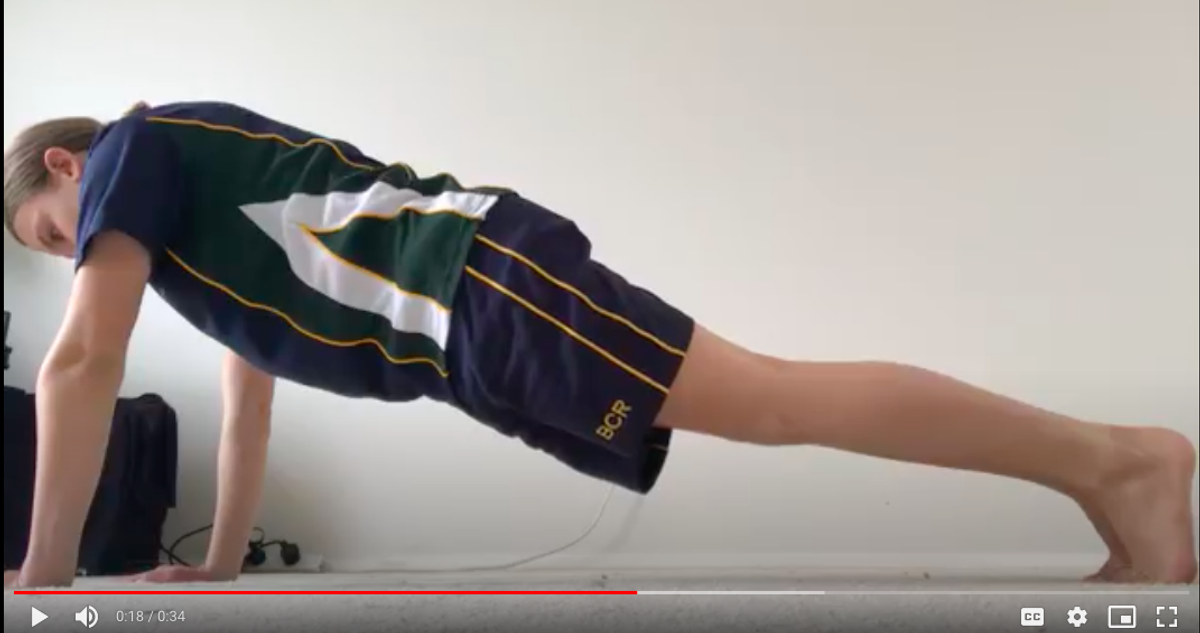



Years 9 and 10 PASS Electives
Our PASS elective sport classes were given a more advanced challenge for their practical assessment. Using a slow‐motion application such as SloPro on Apple, or Slow Motion Video FX on Android, the students needed to video themselves doing the crouch start for a 100m sprint and run 10 metres. After watching a YouTube video of Usain Bolt in the 100‐metre sprint, students then compared themselves with Usain Bolt and described the similarities and differences in technique!
Students were then asked to complete the crouch start again with a second performance video to see if they could improve on their performance. This assessment complemented the unit of work being studied in the theory component of the PASS subject, ‘Enhancing Performance’.
A report from three of our Year 9 PASS students on the remote learning practical assessment task:
During remote learning, we were given both a practical and theory pass assessment task. The practical component required a video of a crouch start for a 100m start, my video was filmed in a nearby park and by my mum. It was a different experience in comparison to other assessment tasks as it needed to be filmed outside. The practical component allowed for me to replay and assess the video, making a comparison between myself and Usain Bolt. I thoroughly enjoyed this element of the task as it allowed me to keep active during lockdown and gain knowledge about the correct techniques/elements of a crouch
start. Following the video taking, there was a theory component which required us to research a chosen piece of equipment, clothing or technical analysis and answer a range of questions regarding this topic.
- Mikayla Burke
During online learning in Term 4, the practical component enabled students of year 9 PASS to complete a crouch start and be active. I performed the crouch start in my backyard, with my sister filming me. I improved on my crouch start through the study and observation of Usain bolt’s 100m crouch start, which helped me improve my technique and skill to perfect the movement. This component gave me the opportunity to learn and grow while comparing ourselves and recognising the differences to the world’s best sprinter, Usain Bolt! Overall, this part of the task was fun and enjoyable and made an assessment much more fun through the participation of physical activity.
- Aisling Connolly
This task allowed me to improve my performance by further understanding the correct technique needed to execute the sprint start in the best way possible. The filming was done in Centennial Park, with the help of my sister. I found this assignment fun and a great learning experience, as I was required to enhance my skills throughout the process.
- Emily Matheson - Rayner
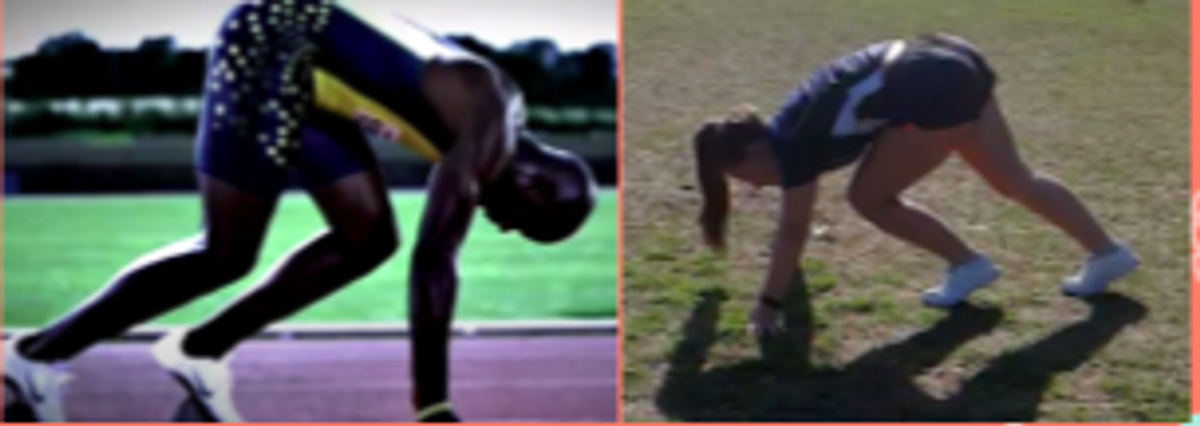


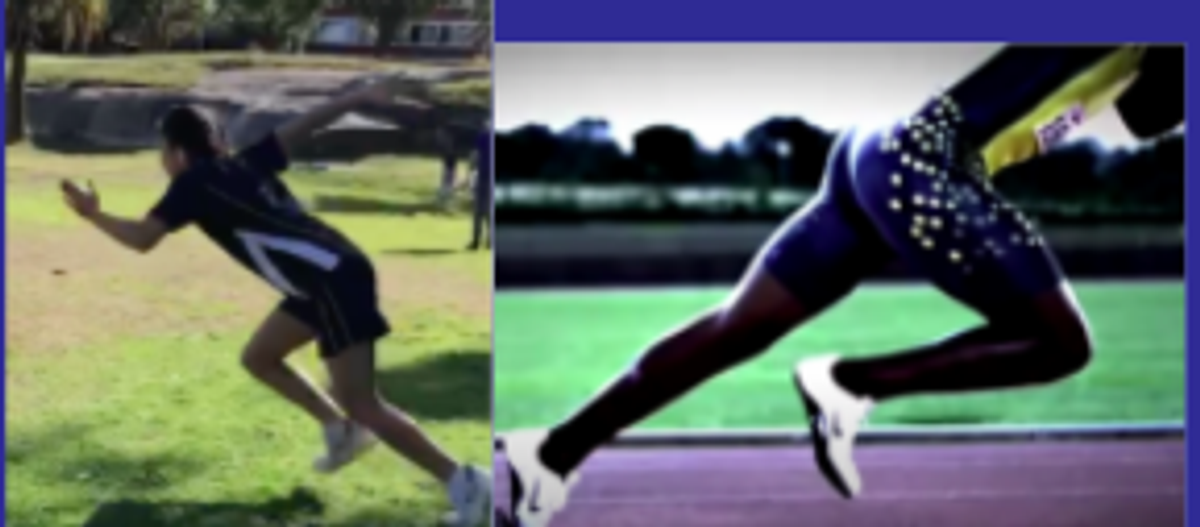
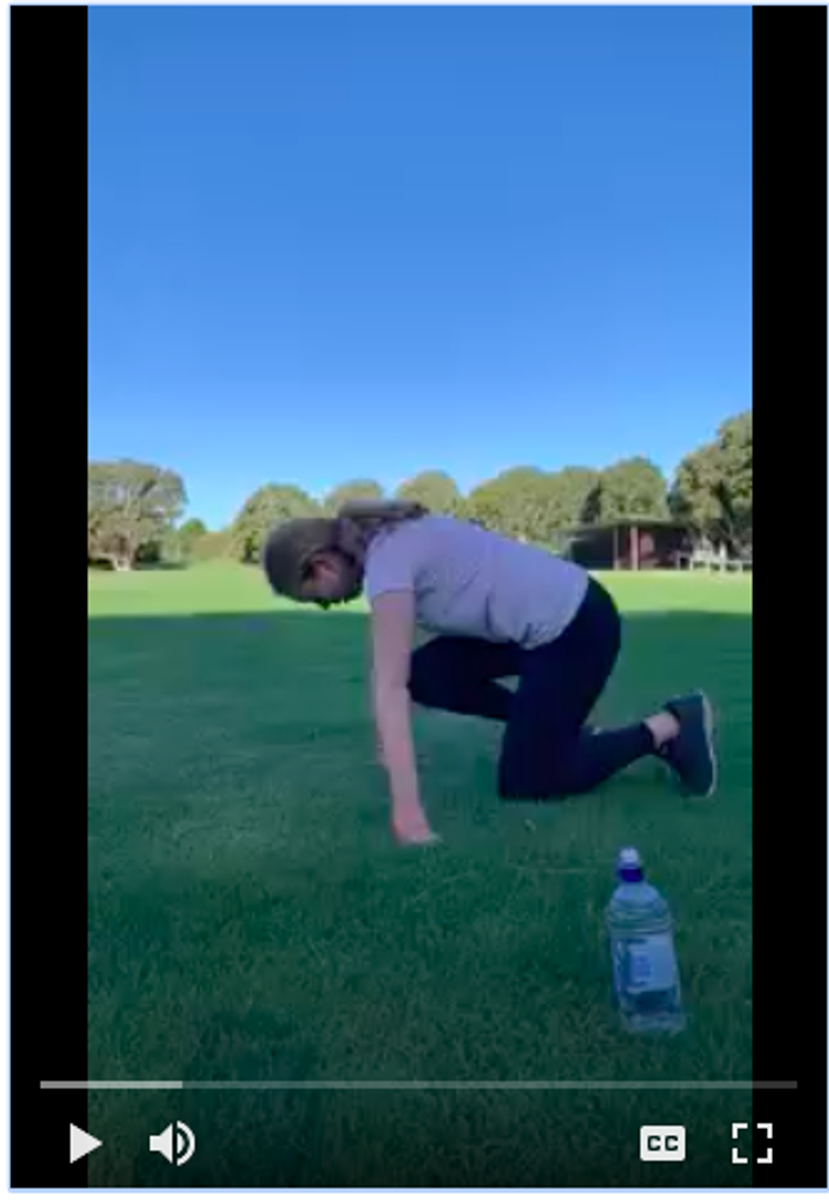





PDHPE students across Years 7-10 have also been working through the various health topics in their theory lessons. Year 7 have just completed a growth and development unit and are now working on a unit called ‘Get Moving’, which is very appropriate after so much sedentary activity over the last few months! Year 8 are studying ‘Celebrating Diversity’, which investigates the diverse nature of the Australian population, recognising and celebrating our differences. Year 9 are investigating the unit ‘Physical Activity For Me’, where they explore the impact of a lifetime of physical activity on health and Year 10 are developing a broad range of skills with the unit ‘Future Success’, that will assist them attaining employment and meeting future challenges. So it has been a busy and engaging term for our PDHPE students!
Year 11 & 12 Students
Our Year 11 PDHPE and Community and Family Studies students are now well underway with their Year 12 work, with some already completing their first HSC assessment. We are impressed with their dedicated work ethic and commitment to their studies.
As we come to the end of Term 4 - we are very proud of our Year 12 HSC students as they completed their final examinations in PDHPE and Community and Family Studies! Onwards and upwards for these girls now and we wish them all the best in their future endeavours.
Vanessa Culhane
Head of PDHPE
Year 9 Visual Arts
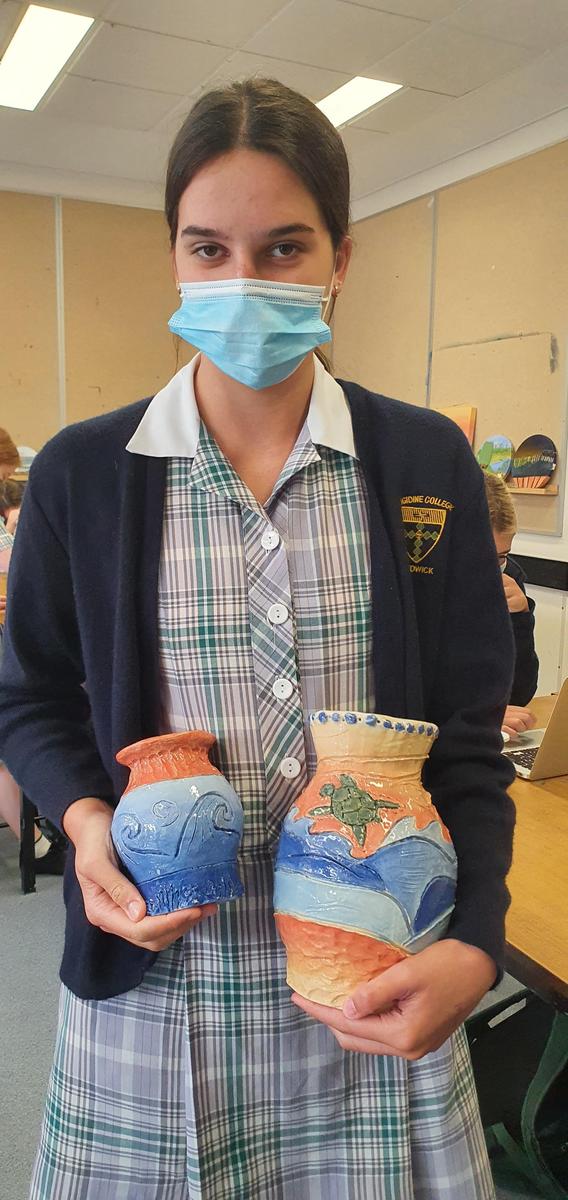
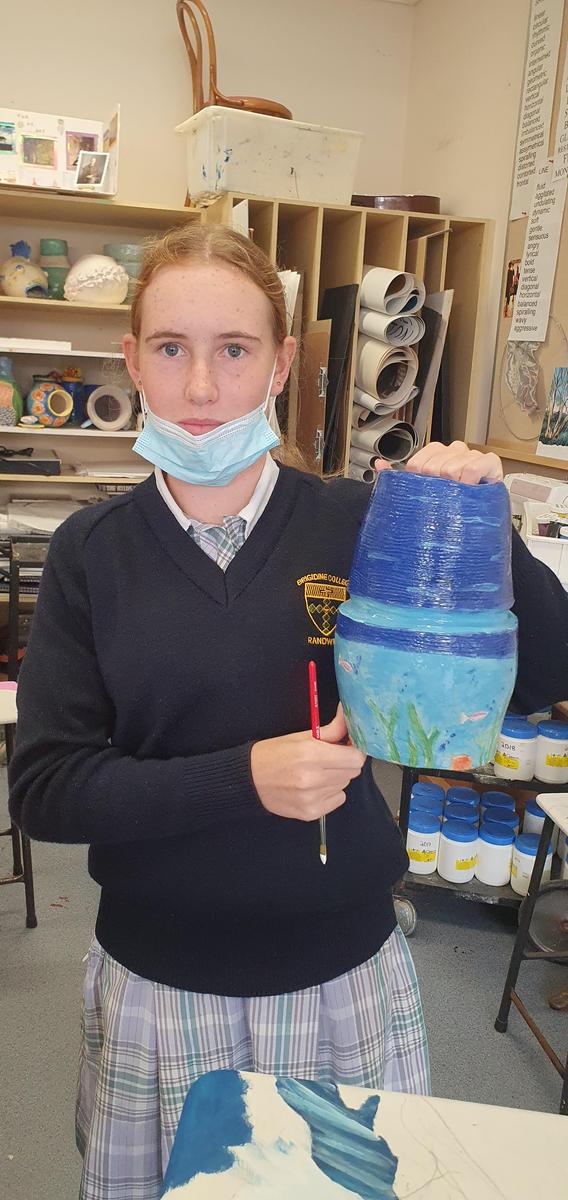
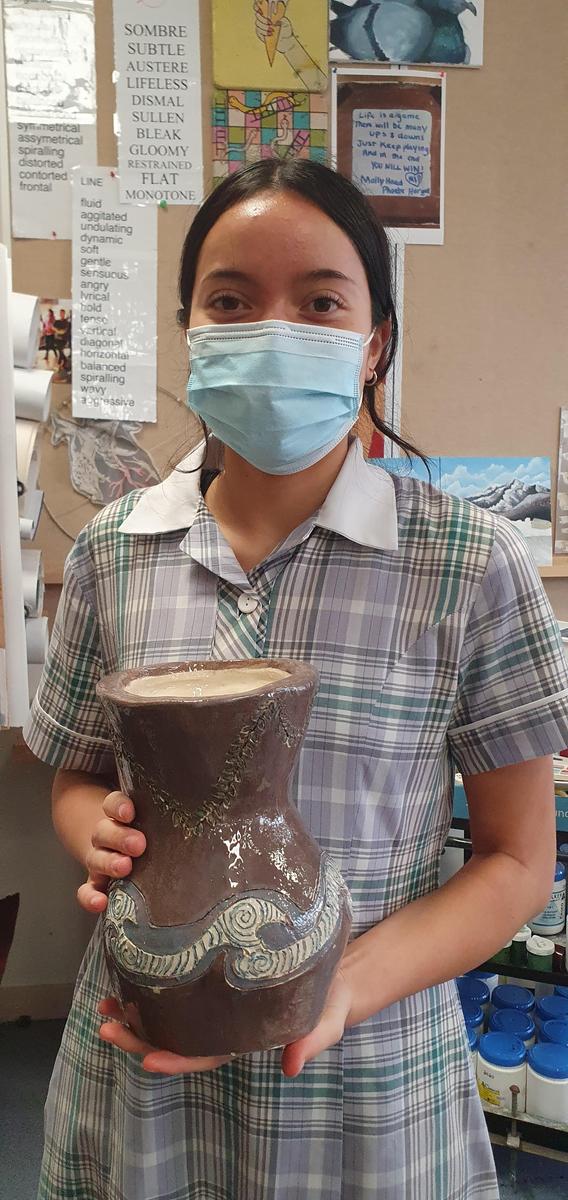
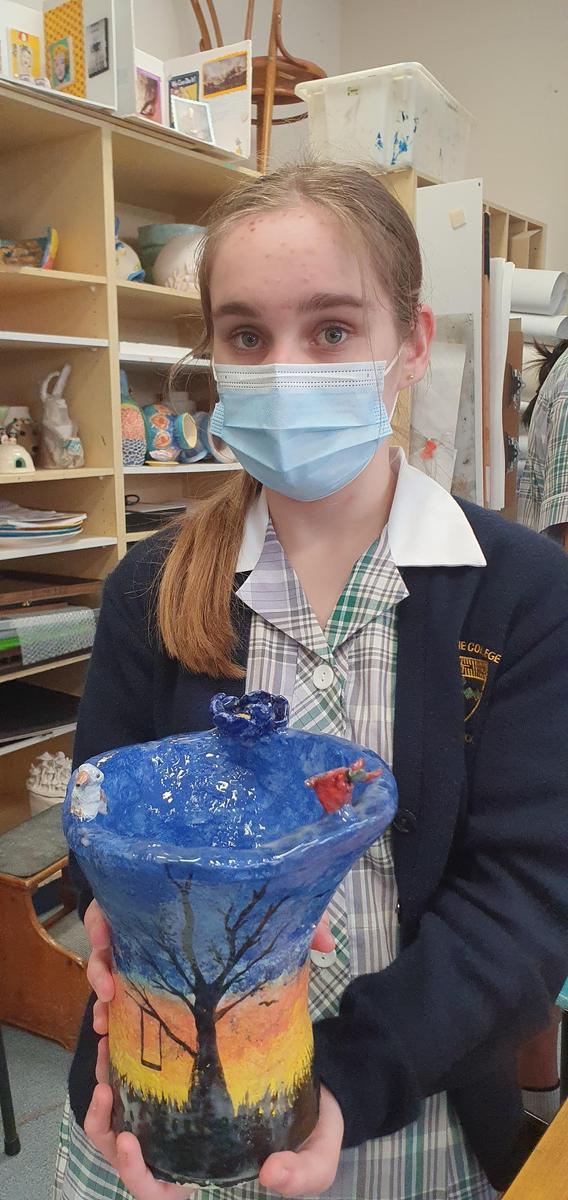

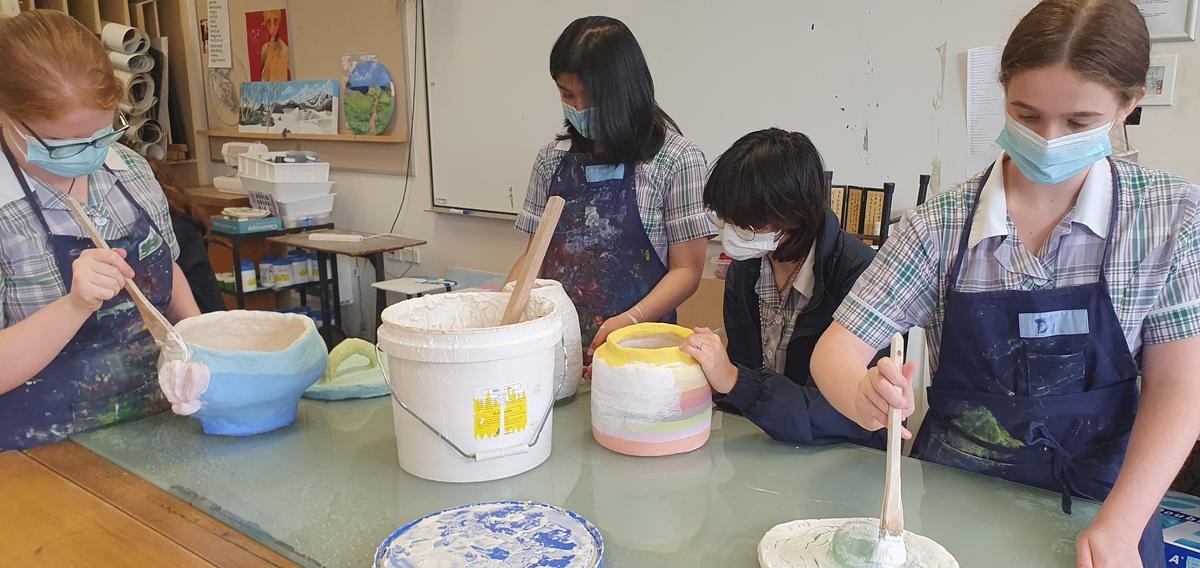
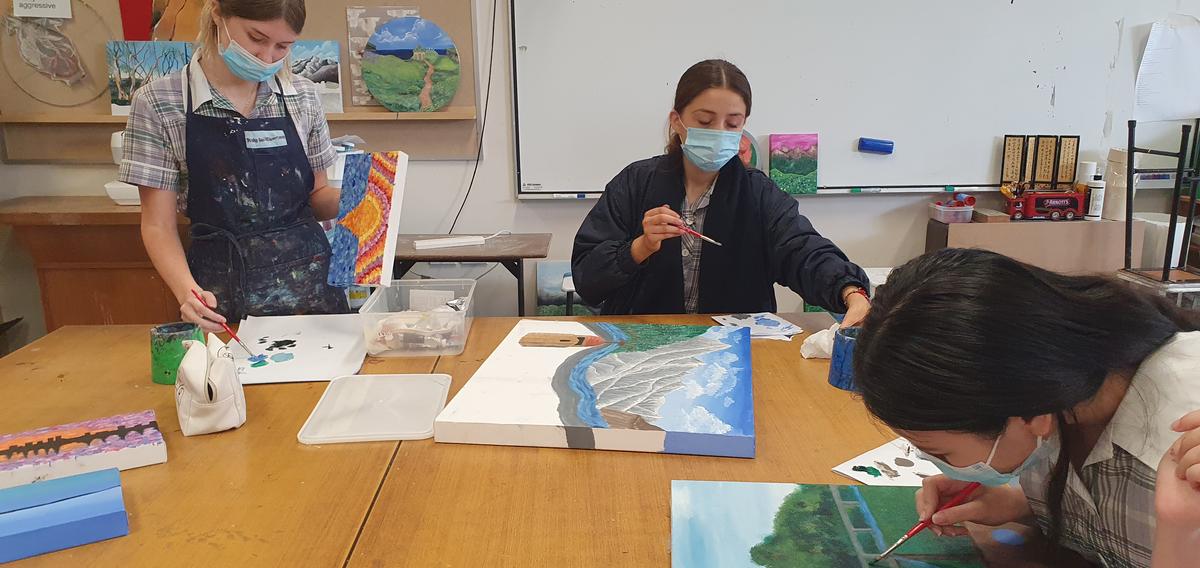







During the lockdown, Year 9 Visual Arts students picked up from the College a paint kit and canvas(es) for their landscape painting. Both students and parents appreciated the opportunity to have a little less screen time. The girls would angle their cameras on their paintings and they could watch each other doing paint exercises, develop their composition and finally paint a landscape. Each girl’s composition was a series of places that held meaning for them. This was the first time they were working with oil paint. It was a big challenge for the girls. At the same time, it was a celebration of place whether it was the snowfields of Thredbo or Maroubra beach. The parents have spoken fondly of watching their daughter complete the painting.
Most of the paintings were completed by the time we returned to the College. Over lockdown, the student’s pots had been fired and the girls were excited to return to their pots to underglaze and gloss their designs. These are based on people and place. The students photographed are holding the first pots to come out of the kiln. With no exhibition for Years 7-10 this year, the pots will be home and Christmas presents for a much-loved member of the family. Many of the Year 9 Visual Arts students have shown themselves to be dedicated and responsible during remote learning. Congratulations girls.
Deirdre Brennan
Head of Visual Arts